Welcome Message by Prof. Olatunde Makanju, NAS Capn, National Association of Seadogs at the 10th Wole Soyinka Lecture held at Council Chambers, North York Civic Centre, Toronto, Canada on 14th July, 2007.
Peace Legislation and The Island of Pyrates.
It is yet another edition of the annual Wole Soyinka Lecture. The lecture series was inaugurated in 1994, the year of the 60th birthday of Nigeria’s Nobel Laureate in Literature, international scholar and human rights activist – Wole Soyinka. It was initiated with the objective of marking the birthday and monumental achievements of one of the great men who performed the historical task of sowing the seeds that germinated into the great tree with many branches, which our organization has now become, way back in 1952.
The Wole Soyinka Lecture Series has also become, for the Pyrates Confraternity, a strategy through which appropriate fora are created to dutifully demonstrate the enviable virtues that make the person being honoured today an asset to humanity. We have been privileged, therefore, to attract intellectuals like Chief Allison Ayida, Chief Arthur Nwankwo, Alhaji Balarabe Musa, late Chief Rotimi Williams (SAN), Professor Olufemi Taiwo, Rear Admiral (Rtd.) Ndubuisi Kanu, Professor Eskor Toyo, and Chidi Anselm Odinkalu to deliver insightful lectures on various aspects of the Nigerian, African and global system. The year 2002, when the lecture was hosted outside of the borders of Nigeria for the first time in London, had Professor Olufemi Taiwo addressing the topic: Of Intellectuals, Politics and Public Policy Making in Nigeria. This edition being hosted by the Canada branch is the second of such gathering out of Nigerian shores. We are so grateful today for having a panel comprising people from very rich and diverse disciplinary and intellectual backgrounds sharing their wealth of opinions on an issue that is paradoxically exciting and tragic.
Each lecture, since inception, addresses a theme of current human need – locally or internationally. This does not only depict our corporate body as walking in the footsteps of Professor Wole Soyinka – whom we refer to in our world as CB – it equally demonstrates our devotion to the doctrine of our organizational existence as enshrined in the Four Compass Points and the Seven Rudder Blades – or the 4/7 Creed for short. Today’s event marks the 10th in this series of showing appreciation to one of the most fertile minds in the world currently, as well as nourishing and immunizing our globe with the annual dose of investigative and solution-proffering reasoning – which has become characteristic of Wole Soyinka Annual Lectures. All of us are a collective part of humanity. We must, therefore, be ready to secure both its present and its future.
Last year’s lecture, the 9th edition, was held in Calabar, the capital-city of Cross River state of Nigeria. The theme, which was addressed by Chidi Anselm Odinkalu, Director, Africa Programme, Open Society Initiative, was Darfur as Metaphor: Conscience, Accountability and Political Instability in Africa. If that is compared with this year’s theme: Humanitarian Effort on a Global Scale with Regards to Darfur, you will notice an obvious convergence. The vividly recurring decimal in the focuses of both editions is Darfur. This proves the pre-eminence which the topic of Darfur, as an international issue and as a region on the continent of Africa, has attained on the agenda of NAS International’s socio-political mediation. As a matter of fact, the 2007 discourse is, no less, a continuation of the Pyrates Confraternity’s Darfur activism. Of course, the 4/7 Creed, being a humanitarian doctrine with a latent pro-active dynamics, elicits urgent response from Seadogs on an island of infernal waste, loss and injustice. Thus the 4/7 Creed teaches us, Pyrates, to be catalysts of positive communal transformation by actively championing noble causes. Darfur, since 2005, has been our noble cause, a challenge, therefore, our community’s extension and one of our islands of operation as Pyrates.
A graphic revision of our subject matter, Darfur, is necessary to prepare our minds for the tragic impact of being involved in its dilation, and, hopefully, proffering solution to its crisis. A milito-political policy of ethnic cleansing, already worse than what occurred during the tenure of Sani Abacha against the Ogoni people of Nigeria, is currently unravelling in that part of the Sudan on the continent of Africa. This purge, an official long-standing project of the Sudanese government, has as its ideological raison d’etre the promotion of the supremacist idea of Tajamu al Arabi or the Arab Gathering. The execution of this morbid project has remained the ignoble duty of the Sheik Musa Hilal-led Janjawid; the notorious Arab Militia; parliamentarians; the Sudanese intelligence services; governors; and the demagogic expert in ethnic cleansing – Dr. Hassan Al-Turabi who has been conscripted by one Colonel Ghadafi of the neighbouring Chad Republic – all commissioned and mandated by the Sudanese government.
The official governmental display of the ideology of hate in Darfur has an amazing genocidal proportion. Reports by concerned international watchers of the unfolding events confirm an estimated 200,000 deaths in the four years of the pogrom. Over 2.5 million displace people have been forced into camps within Sudan itself, while more than 250,000 victims have been forced into refugee camps in Chad. These scenarios have been created as a result of inhuman activities such as rape, abduction, looting and killing of Darfurians by agents of the Sudanese government. Until recently, refugees were denied access to humanitarian provisions, and this increased the average death to 18,000 per month. The Omar Hassan al-Bashir government in Khartoum a few weeks ago, agreed to allow a joint force of 20,000 comprising African Union and United Nations to engage in peace-keeping operations that can stem his bloody operations after a long period of denial.
The racist-inclined sub-human taste, clearly typical of the Hobbesian state of nature, is targeted at exterminating the black people of Darfur from the surface of the Sudanese earth in a most South African apartheid-like fashion. It was described by Professor Wole Soyinka, in his brief foreword to the 2006 lecture titled, The Rape of Darfur, as a confirmed Sudanese government-championed “methodical pogrom of the African peoples of Darfur”. Cynically reacting, then, to a Janjawid-originated instruction given in a classified document found at the secretariat of the militia’s leader, charging and empowering Arab men to systematically annihilate African tribal groups by violently raping their women: “change the demography of Darfur and empty it of African tribes”; Professor Soyinka raised the subtle alarm; “Change the demography of AIDS. Turn Darfur into an AIDS assisted necropolis”. The lesson in this cynicism is well understood: Darfur has already been transformed, by simple-minded men, into a successful grave yard. This is the reason why he enjoined us Pyrates, to “proceed beyond words, and spearhead acts of conscience on behalf of our beleaguered humanity in the black region of the Sudan”.
The Darfur challenge, then, became a more serious pyratical challenge which necessitated our organization’s more active involvement by acting over yap on the condition of the peoples of the region. The 2007 Darfur Day, as pronounced by the United Nations, was sufficiently observed by members of the National Association of Seadogs in various parts of Nigeria, including the Federal Capital Territory, Abuja, with rallies, peace walks, and, in some cases, church prayer services for the people of Darfur. A media campaign, targeted at putting an end to the wastage of human lives and the denigration of human dignity going on in Darfur, commenced last year and it is still running on both local Nigerian and international media. This campaign was funded through a grant given our organization by The Darfur Coalition. We are equally proud to state that the Pyrates Confraternity mounted a massive lobbying to prevent the Sudanese President, Omar Hassan al-Bashir, from becoming the chairman of African Union in January this year.
The pyratical humanistic ideal, as contained in the Four Compass Points, constitutes both philosophy of action and theory of living. When Professor Soyinka made that statement that has now become one of the world’s most popular political and human rights maxims, in his prison autobiography The Man Died that “Justice is the first condition of humanity”, only a few people knew that he was expressing a pyratical conviction. Those few cognoscenti, then, were Pyrates. As watchdogs of both our immediate and remote islands and minders of our neighbours’ concerns, we Seadogs subscribe to another version of that belief as expressed by a like-mind, Adolphe Joffe, to the Russian liberal communist philosopher and politician, Lev Davidovich Trotsky, that “Human life has meaning only to that degree as long as it is lived in the service of humanity”. For us Seadogs, our lives cannot be counted as being meaningful without playing our mandatory roles as saviours of all and servants of the weak and underprivileged. That is the living example of our spiritual head, Professor Wole Soyinka. It is the dictate of our third compass point – For Humanistic Ideal. The island of Pyrates, we all must understand, is an island of eternal service.
The Pyratical 4/7 ethical code of living, which animates our organization’s principle and action, is also the scriptural system that supplies the major theoretical and philosophical resource for Professor Soyinka’s humanitarian legislation of peace by way of dedicating the self to the ideals of truth and justice at home and abroad. The Pyrates Confraternity, for the combative Justice of Peace, is one of many privately constructed truth commissioning techniques. The existence of the counter-conservatively resilient organization for more than fifty years now obviously upholds itself as Soyinka’s radical methodology of peace activism through a selectively collectivized approach. Today, the essence of the organization stands as one of the boldest testaments to Soyinka’s pragmatic essence.
Central to the Pyrates’ Confraternity’s humanitarian vision as well as Professor Soyinka’s humanistic vision is conviction – the same motive that compels a Seadog/Pyrate, throughout his entire pyratical life, to uphold as code of pyratical decorum actionalization of conviction and acting over yapping. Conviction, then, as a current in Soyinka’s humanitarian dynamism, derives its root from, and has its goal in, the Pyratical Utopia. The only reason for the existence of the Pyrates Confraternity as a body in the world today is anchored onto its uncompromising stand on social justice. This is derived from the idea of who a Pyrate actually is:
…a truly liberated person who, having identified the ills militating against the attainment of a just and an egalitarian society, shows resolve to combat them… Conviction-for-change is a non-negotiable life-wire of Pyratism. It is the very force that motivates and sustains a Seadog, both within the confraternity and on the island (society), which he has identified and appropriated for his humanitarian mission.
Wole Soyinka, in the company of Ralph Opara, Pius Oleghe, Ikpehare Aig-Imoukhuede, Nathaniel Oyelola, Muyiwa Awe and Sylvanus Egbuchelum were the instruments of the formation of the Pyrates Confraternity in 1952 at the then colonial University College Ibadan. For the Original 7, as we normally refer to them, the organization and the ethical bedrock upon which it was founded were their collective vision for their society at that period in the history of their immediate world, that is, the yet to be independent Nigeria of the time. Little did they know that their vision would be capable of growing beyond them to the extent of having its island spread as far as Darfur in Sudan in years to come.
The origination of the Pyrates Confraternity is a bold testament to the beginning of the Original or Magnificent Seven’s functional life on the island of their immediate and remote communities. It marks the emergence of their conscious insistence on egalitarian values across the diverse islands of humanity. This is the heritage of which we are partakers, and which we have to protect, in the 21st century, as members of this noble, but highly misunderstood, organization.
The Pyrates Confraternity, stands today as a veritable humanitarian movement tactically empowered with the human, material and intellectual potential to investigate, challenge and exterminate moribund conventions from any community in the world occupied by human beings – be they blacks, whites, Caucasians, Arabs, etc. That the globe is the island of the Pyrates Confraternity’s peace legislation is well written into the theme of the 2007 Wole Soyinka Lecture – Humanitarian Effort on a Global Scale with Regards to Darfur.
Being one of the founders of the National Association of Seadogs, or Pyrates Confraternity, it is significant for Professor Soyinka because this fact betrays his first attempt at conscious organizational peace legislative effort. It is necessary to remark that many other structures have emanated from the sincerity of his commitment to truth-commissioning projects, thus reinforcing the high value that he places on the functionality of organizational institutionalization as a key strategy in intra and international, class, and racial peace negotiation. Following this example, our association steadfastly believes in organizational hard work for ensuring humanity’s peaceful co-existence. Our central involvement in the activities of the Federal Road Safety Commission in Nigeria (FRSC), coupled with our human rights efforts in the African Democratic League (ADL), and the Volunteers for the Defense of Freedom (VODEF), during Nigeria’s dark years under military dictatorship, are testimonies to this assertion.
In a humanistic sense, the universal man is, for us 21st century Pyrates, an endless ocean for unceasing active exploration – not for looting other people’s wealth and battering of their dignity, as anti-humanistically demonstrated by the pirates of the Medieval and the Renaissance ages in the Caribbean and Europe. We exist for the restoration of the dignity of humanity. This is the crux of the Pyratical creed.
Racial cleansing, hatred and dehumanization of fellow men and women are active preoccupations of the present government of Sudan under President Omar Hassan al-Bashir. These practices, together with the psychological attitude that gave birth to them embrace moribund conventions, of which Seadogs, worldwide, including Professor Wole Soyinka, are sworn enemies.
The 4-7 Creed has offered itself to us as a doctrine of re-inventing humanity. Modern chivalry, informed by a profound belief in Pyratical Utopia, then, evolves as a way of life towards the goal of fashioning a new humanity. This ideal allots Darfur, in Sudan, to us as our island of heroic intervention. In it also rests the roots and purposes of the confraternity, and Professor Soyinka’s concepts, processes and tactics of truth activism and, in effect, universal peace legislation.
Thank you all for listening.
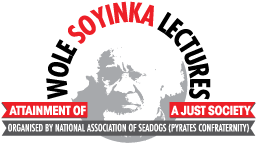
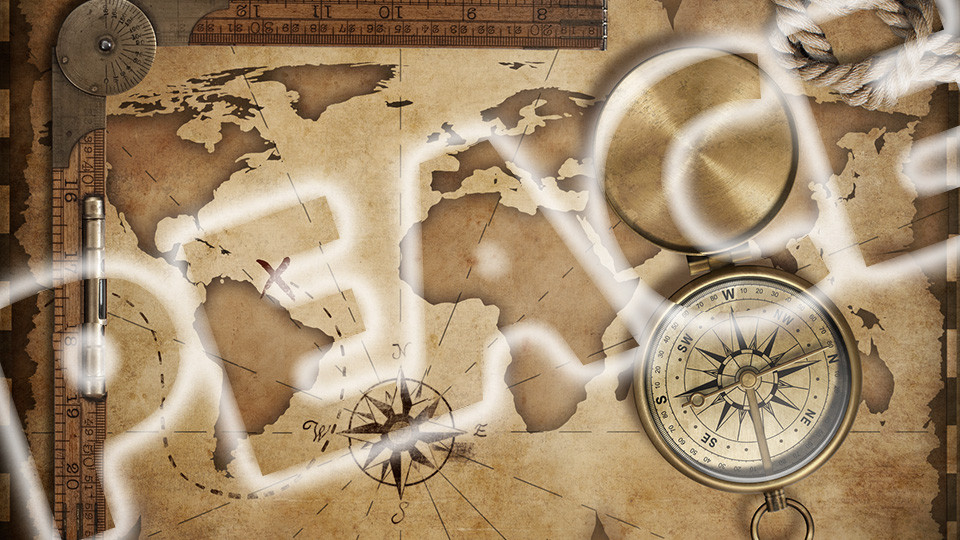
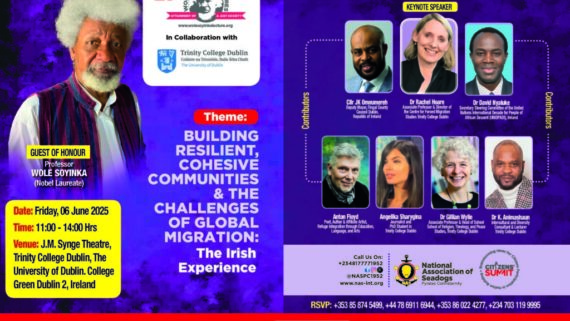
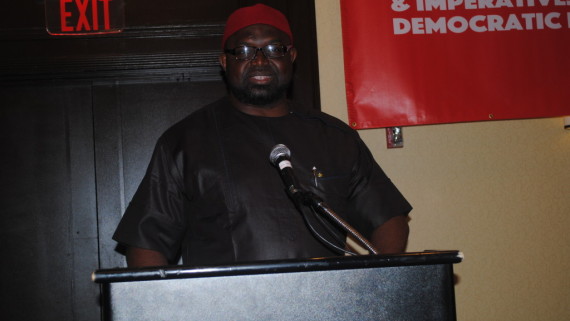
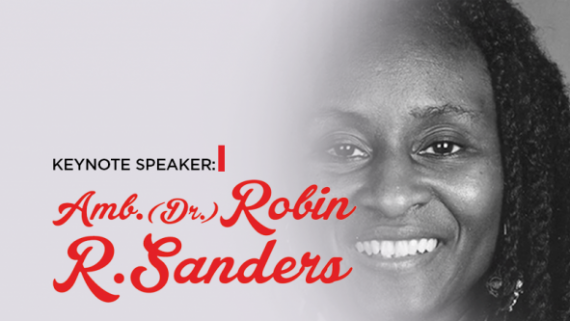
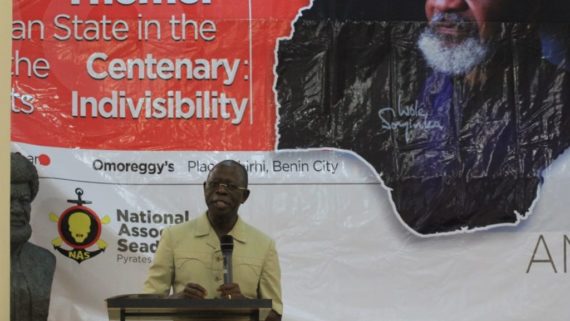
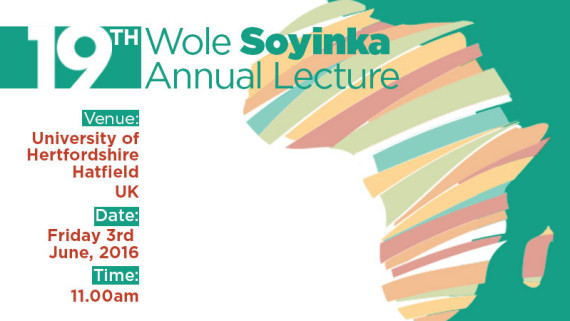
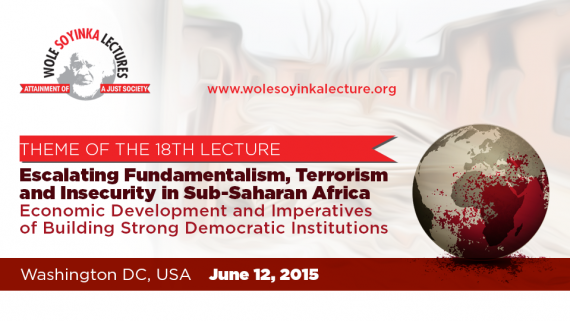
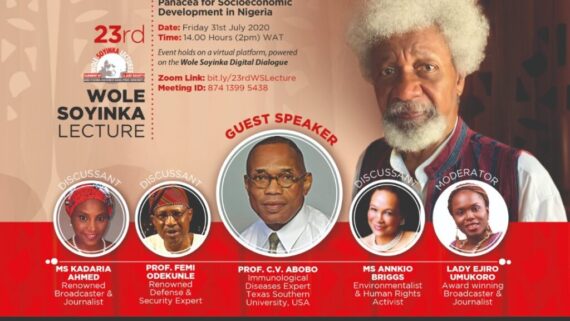
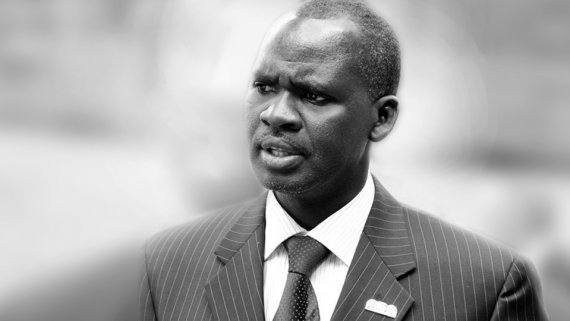
Comments
No comment yet.